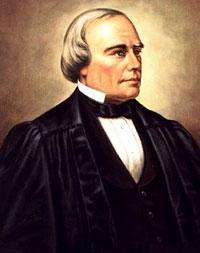The Volokh Conspiracy
Mostly law professors | Sometimes contrarian | Often libertarian | Always independent
Today in Supreme Court History: September 30, 1857
9/30/1857: Justice Benjamin Robbins Curtis resigns from the Supreme Court after Dred Scott v. Sandford (1857).

Editor's Note: We invite comments and request that they be civil and on-topic. We do not moderate or assume any responsibility for comments, which are owned by the readers who post them. Comments do not represent the views of Reason.com or Reason Foundation. We reserve the right to delete any comment for any reason at any time. Comments may only be edited within 5 minutes of posting. Report abuses.
Please to post comments


The Mass SJC had ruled the opposite way.
Yes, but 1) that was some years before and 2) in that case the girl at issue was in a free state (Massachusetts) whereas Scott had for some time been in a slave state (Missouri). Also under the Supremacy Clause the Dred Scott case overruled Aves.
One question I never see answered is: Did the Dred Scott ruling have any legal effect? The U.S. Supreme Court held that black people had no rights as against the white man. There were hundreds of black voters in the North. Were they automatically thrown off the rolls? How about other black plaintiffs? Were their cases automatically dismissed? How about black property owners? Did their lands "escheat"? Could a black woman still go to the police if she was raped by a white man?
The ruling was that Black people, slave or free, had no rights under the U.S. Constitution. States were free to hold otherwise under their respective state constitutions, but could not override the property rights of a slaveholder (except by eminent domain).
As far as I know, no state in 1857 had an anti discrimination statute.
Many wonder why Confederate president Jefferson Davis was not tried for treason. I believe the answer is quite simple: the government was afraid the Supreme Court would hold Davis had not committed treason (per the Constitution) and would affirm a state's right to secede.
Davis was captured in 1865, just eight years after the Dred Scott decision. Five of the justices who had been part of the 7-2 majority were still on the Court, and both the dissenters were gone (one replaced by Buchanan, one by Lincoln).
In his memoirs Grant made the point that Lincoln didn’t really want Davis to be captured because what would he do with him?
As for secession, I don’t think anyone disagrees that a state has the right to secede. But that was hardly the issue.
Mob drives a black man and his family from their house, a white family moves in. Black man sues the white man or the mob. Case dismissed; he has no rights.
Black man goes to vote in the 1858 election and finds that he's been crossed off the rolls (together with all the other black people in the precinct). Sues for election fraud. Case dismissed; he has no rights under Dred Scott, and there is no state provision that protects black people against discrimination.
Black man builds a barn and gets stiffed by the white owner. He sues for breach of contract. Case dismissed; he has no rights.
Black man is lynched. Son sues for wrongful death. Case dismissed; he has no right to sue.
I'm wondering if anything like the above happened.
My guess is that the Dred Scott holding was ignored, except in rendition situations. From what I read, 1857 - 1860 was a period of hysteria anyway.